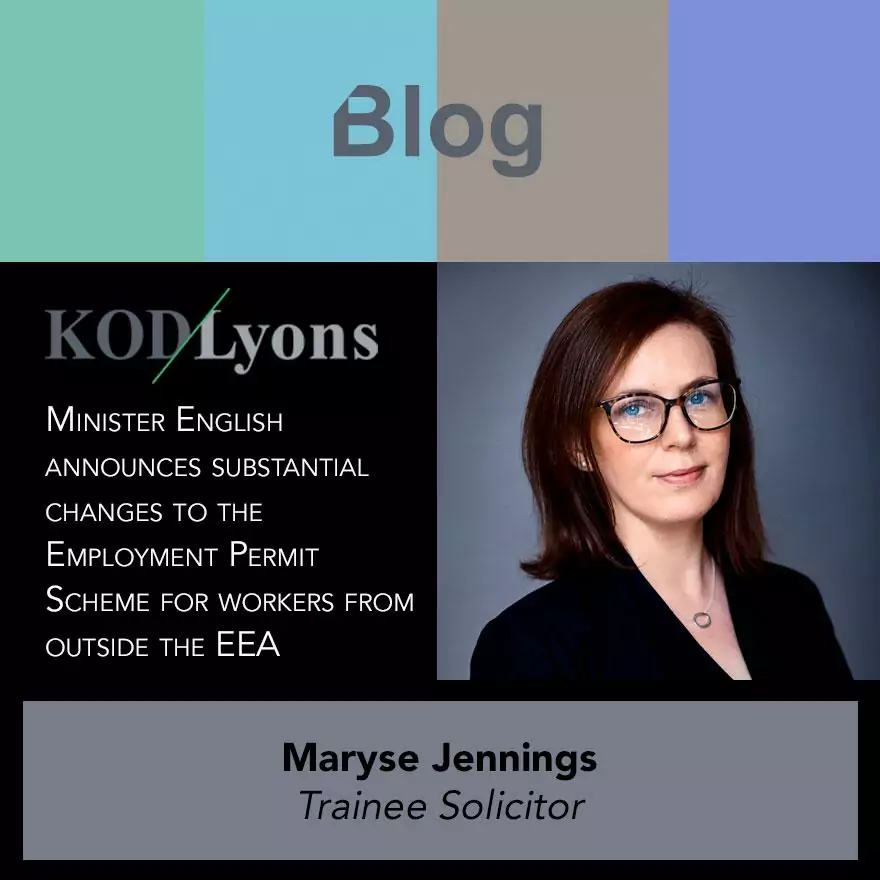Minister English announces substantial changes to the Employment Permit Scheme for workers from outside the EEA
Ireland operates a managed employment permit system through occupation lists, namely the critical skills and ineligible occupation lists, which are reviewed twice a year to ensure their ongoing relevance to the State’s human capital requirements. This is an evidence-based process that takes account of labour market conditions and submissions from sectors and other stakeholders together with contextual factors, including in the current context, COVID-19. The purpose of the system is to maximise the benefits of economic migration while minimising the risk of disrupting the Irish labour market.
The employment permits system is designed to attract highly skilled workers from outside the EEA to Ireland, to meet skills demand in the economy where those skills can’t be accessed through the resident labour force. For the purposes of the employment permits system, occupations fall into three categories:
Occupations listed on the Critical Skills Occupations List are highly skilled professional roles that are in high demand and are not always available in the resident labour force[1].
Ineligible occupations are those with evidence that there are more than enough Irish/EEA workers to fill such vacancies. Employment permits are not granted for these occupations. Ineligible occupations are generally lower skilled occupations such as personal services and operatives.
Every other job in the labour market, where an employer cannot find a worker, is eligible for an employment permit[2].
The main changes announced include:
- Most construction sector jobs now eligible for a General Employment Permit Quota to be removed for HGV driver work permits
- 350 General Employment Permits for hospitality managers
- Social Workers to be eligible for Critical Skills Employment Permit
- Dispensing Opticians to be eligible for General Employment Permit
- New General Employment Permit quotas for 1,000 Horticulture Operatives, 500 Meat Deboners, 1500 Meat Processing operatives and 100 Dairy Farm Assistants; with a strategic review of labour attraction and retention in the sector to follow
- New General Employment Permit quota of 100 for Work Riders
Construction
The construction sector will see eight additional categories of occupation that are now eligible for a General Employment Permit meaning that almost all occupations in the construction sector are eligible for a General Employment Permit:
- Electricians
- Masons
- Roofers, Roof Tilers and Slaters
- Plumbers and Heating and Ventilating Engineers
- Carpenters and Joiners
- Floorers and Wall Tilers
- Painters and Decorators
- Construction and Building Trades Supervisors
Transport, Logistics and Supply Chain Sector
Recognising the ongoing issues facing transport and logistic operators exacerbated by COVID-19 and Brexit, changes are now introduced that any HGV drivers recruited from outside the EEA will be eligible for an employment permit without the limitation of a quota.
Hospitality Sector
A quota of 350 permits is being made available to address the immediate need at management level for the hospitality sector. The quota will be subject to a framework requiring a recognised third level qualification and five years experience in the role.
Agri-Food and Agriculture Sectors
Addressing the immediate need for workers, additional permit quotas are introduced: 1,000 for Horticulture Operatives, 500 for Meat Deboners, 1,500 for Meat Processing Operatives and 100 for Dairy Farm Operatives.
In addition, a quota of 100 general employment permits will be made available for Work Riders in the equine sector.
Healthcare Sector
Changes already announced this year made the role of Social Worker eligible for a General Permit, however the sector has provided further evidence that availability of qualified Social Workers is still insufficient to meet demand. To address this immediate recruitment challenge and as part of this Department’s continued efforts to support the healthcare system, Minister English has announced that the role will now be made eligible for a Critical Skills Employment Permit.
The role of Dispensing Optician will now be eligible for a General Employment Permit.
Should you require assistance with applications for employment visas, Citizenship and naturalisation, International Protection, general immigration matters or visa applications, please contact Stephen Kirwan (stephen.kirwan@kodlyons.ie) of this office.
[1] Occupations on this list are eligible for a Critical Skills Employment Permit (CSEP) and include roles such as medicine, ICT, sciences, finance and business. Special “fast-track” conditions attach to this permit type including the eligibility to apply to the Department of Justice for family members to accompany the permit holder immediately; and after two years may apply for permission to work without the requirement for an employment permit.
[2] For these occupations, the employer is required to undertake a Labour Market Needs Test (that is, advertise the job four weeks from 1 January 2020) and if no-one suitable applies for the job, the employer is free to apply for an employment permit. Occupations such as these may be skills of a more general nature and are eligible for a General Employment Permit (GEP). This permit type is renewable and after five years the applicant may apply to the Department of Justice for long term residency permission
Get in touch
Leaders in our field and winners at the Irish Law awards we have proven expertise in immigration and international law, child and family law and personal injury litigation.
Tel: +353 1 679 0780
Email: info@kodlyons.ie








